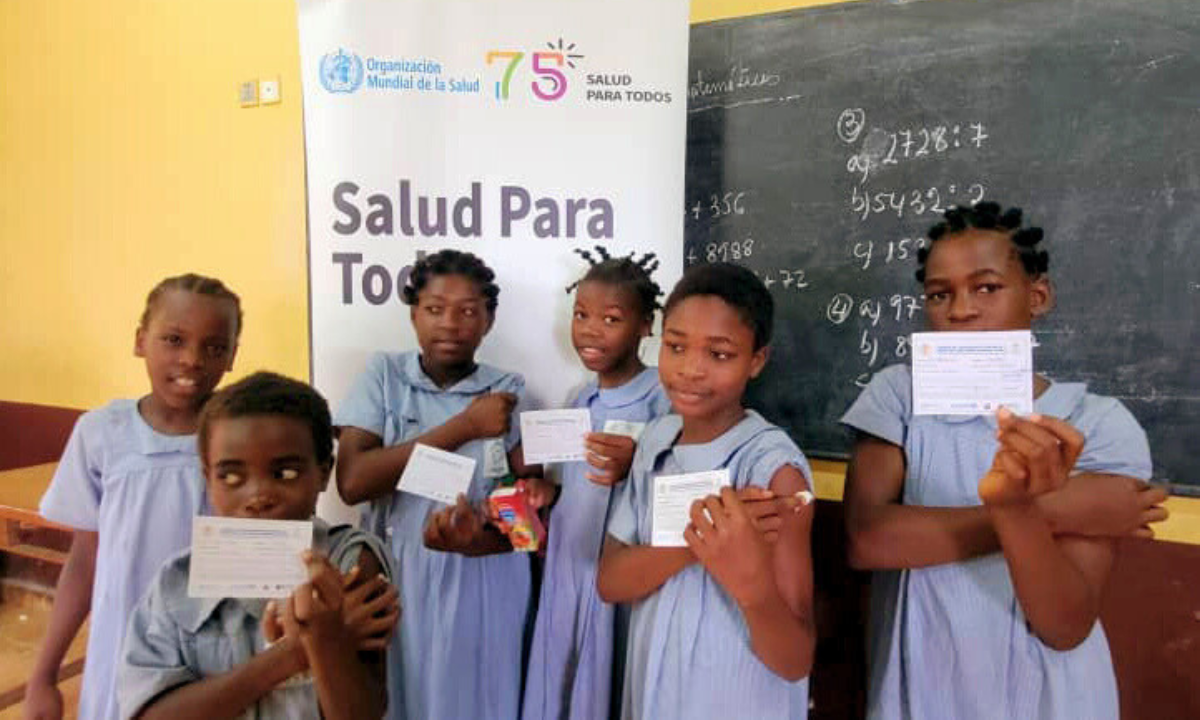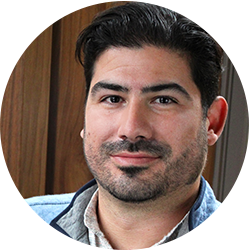MCD Launches First-ever Pilot Vaccination Campaign Against Human Papillomavirus in Equatorial Guinea
June 21, 2024

Group of girls holding up their vaccination cards after receiving the HPV vaccine in their school on Bioko Island, Equatorial Guinea.
MCD Global Health’s Cervical Cancer and Screening Treatment (CCST) project, funded by Noble Energy EG Ltd (A Chevron Company), and Equatorial Guinea’s Ministry of Health and Social Welfare (MOHSW) have completed the first-ever pilot vaccination campaign against the human papillomavirus (HPV) in the country’s history.
From Wednesday, May 22, through Friday, May 24, more than 750 girls aged 9 to 13 from more than 20 communities in the Baney Health District received the HPV vaccine on Bioko Island, where Equatorial Guinea’s capital is located.
This effort was the result of collaboration between MCD’s CCST project, Chevron, the World Health Organization (WHO), UNICEF, and other partners supporting Equatorial Guinea’s MOHSW. Together, they are all working toward a future free of cervical cancer in Equatorial Guinea.

The campaign was a pilot initiative to vaccinate girls in the Baney Health District. Long-term plans include raising awareness about the importance of the HPV vaccine, scaling up vaccination efforts and coverage, such as including boys and girls, and incorporating the vaccine into the country’s routine Expanded Program on Immunization.
“We are incredibly proud to see this campaign come to life, from procurement to vaccination, after several years of planning,” said Guillermo García (image at right), deputy director of MCD’s International Programs. “This milestone was possible thanks to the support of Equatorial Guinea’s First Lady, Constancia Mangue de Obiang, who championed the initiative and its approval. Our hope is that this initiative sets a precedent for continued health advancements in Equatorial Guinea.”
Cervical cancer is curable if diagnosed and treated early, but poor access to prevention, screening, and treatment contributes to 90% of all deaths, according to the WHO. It accounts for 22% of all female cancers and 12% of all newly diagnosed cancers in both men and women every year. In Africa, 34 out of every 100,000 women are diagnosed with cervical cancer, and 23 out of every 100,000 women die from it every year, according to the Africa Health Organization.
“We are thrilled to launch this historic vaccination campaign against HPV, a significant step toward safeguarding the health of our young girls,” said Dr. Manuel Ondo, technical director of MCD’s CCST project and a member of the Sexual Reproductive Program at the MOHSW. “This initiative demonstrates our commitment to reducing the burden of cervical cancer in Equatorial Guinea. By collaborating with MCD, Chevron, and other partners, we are ensuring that our girls receive the protection they need for a healthier future. This campaign is just the beginning, and we look forward to expanding our efforts to reach even more children across the country.”
Since 2016, MCD’s CCST project has been operating in Equatorial Guinea with the goal of providing early screening and treatment for women to diagnose and treat cervical cancer.
More than 35,000 women have been seen in health facilities across Equatorial Guinea. More than 800 cases of VIA-positive lesions have been detected, which may have otherwise progressed to cancer, and nearly 200 health professionals have been trained in different cervical cancer prevention methods.
MCD was one of the first international nongovernmental organizations to use the low-cost, one-visit ‘screen-and-treat' therapy in low-resource countries. Specifically, teams use visual inspection with acetic acid as the main diagnostic tool, along with the Lugol’s iodine technique for precancerous lesions. Positive cases are treated with cold coagulation therapy to prevent the progression to cancerous lesions, an affordable and easy-to-learn method with minor side effects. Patients with lesions are also referred to gynecologists for follow-up treatment.
In addition to the CCST project, MCD’s Bioko Island Malaria Elimination Project (BIMEP) has been operating for two decades in Equatorial Guinea, working to prevent and eliminate malaria on Bioko Island.